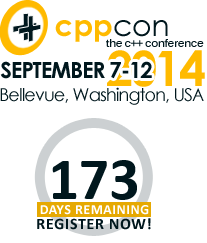Native Code Performance on Modern CPUs: A Changing Landscape -- Eric Brumer

Be prepared for deep content from a compiler optimizer architect, and quite a bit of subtle dry humor.
Native Code Performance on Modern CPUs: A Changing Landscape
by Eric Brumer
Compiler developer, Visual C++ teamModern CPUs are fast. Really fast. New instructions, wider vector registers, and more powerful CPUs promise faster code. But reasoning about performance is not as it seems on the surface. This talk will dive deep into how advancements in the latest chips force some rethinking of native code performance, from the point of view of a compiler developer. The performance landscape is changing. Come see what that means.



 A nice short overview of when you might want your associative container to use a contiguous implementation instead of a tree under the covers:
A nice short overview of when you might want your associative container to use a contiguous implementation instead of a tree under the covers: In this article, Eric Niebler discusses an issue of API design regarding the age-old question of out parameters versus return-by-value, this time in light of move semantics. He uses
In this article, Eric Niebler discusses an issue of API design regarding the age-old question of out parameters versus return-by-value, this time in light of move semantics. He uses  Jeff Preshing gives a nice overview of the on-again/off-again/on-again status of a common approach to lazy initialization.
Jeff Preshing gives a nice overview of the on-again/off-again/on-again status of a common approach to lazy initialization. The start of my series about the papers for the upcoming Chicago meeting, starting with C for Concurrency:
The start of my series about the papers for the upcoming Chicago meeting, starting with C for Concurrency: A nice comparison on converting a string to int:
A nice comparison on converting a string to int: